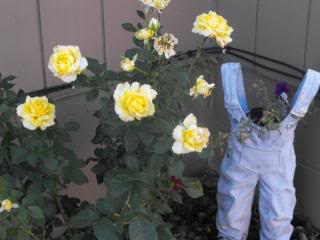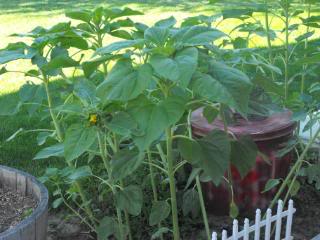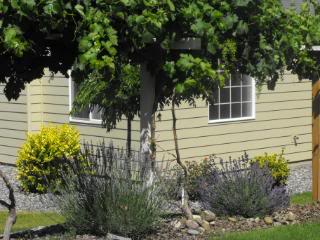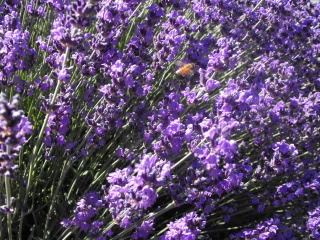This song by the Archies played loud in my mind as I received my first bee stings of the season. They got me while I was reaching my hand into my beautiful lavender bush. Luckily, I am not allergic to the little guys. Dancing around in pain, I found myself scolding them. “Hey! Don’t you know that I am on your side? I planted bee-friendly plants just like MaryJane, Burt’s Bees and the rest suggested! I even follow the bee project, reading all I can on the plight of you guys. Did you not get the memo?”
While watching my finger swell, I was reminded of the scene from Bee Movie where Adam is lying in the hospital bed, hooked up to honey after stinging the mean lawyer guy. Somehow my anger dissipated at the thought that now I too have an injured bee on hand.
When Bee Movie was released, I embarrassed my then 11-year-old son by belting out the movie’s soundtrack. But I was glad that I had gone. I was glad that the movie, in its own sweet and funny way, opened the conversation to a very important topic: Colony Collapse Disorder (CCD). CCD fascinates me. It begs the question, why? Like in Jerry Seinfeld’s little cartoon, it is an indicator of a bigger problem. If we subscribe to the reasoning that every cause has an effect (which I do) then we must ask ourselves, “What is the cause?”

There are always those of us who don’t want to hear the questions, let alone the answers. Then there are those of us who want to debate the question and its validity. And there are those of us that are at least willing to have the conversation and do whatever we can to be a part of the solution. I am glad that I am in that category. Doing my small part, I planted “bee-friendly flowers.” I am tracking the bees that are living here in my flower beds and reading up on as much of the conversation as possible. It is important to me. See, I still am naive enough to believe that one little Farmgirl can change the world…well, at least my world, and I plan on doing so.

Wanting to gather as many of the facts as I could, I went to the USDA’s website and read paper after paper by scientists from Penn State and more. My theory is that when the mainstream universities are discussing the issues, it is probably more serious then we think. Way too often it seems that when those in the organic movement tell us about an issue (which they have for quite some time), it is downplayed by those in the conventional world. But when the scientific community starts talking about it, I think it is worse than they want us to know. Boy, how I wish we could close that gap, but maybe that is another topic for another day. At least at this point in the conversation we can agree that it is a legitimate issue, one that deserves our full attention and awareness. The little guys need us. Sure there are some inconveniences with having them as neighbors, but for the greater good they are worth it.

If I do the best I know to do in my corner of the world, and you do the same, and your neighbor does the same…pretty soon our collective actions have changed the whole world. How sweet is that?










Ah, even though I am a wee bit afraid of bees (when one buzzes by my head I usually let out a little AYEEE!) our family made it a point to have a SUPER bee friendly garden. We even talked our neighbors into doing the same, and when we’re out in our front yards…we often talk about how many bees we’ve seen out and about. Happy to report, at least in our little neck of the woods…the bees are happy and plentiful!
🙂
Totally agree!
Living rurally as I do, surrounded by orchards, I know well how important bees are! I always hope someday to get a hive too! Sometimes a whole hive will leave with their queen and take up residence in a pasture close by. Sometime I will have a home ready for the bees when this happens and maybe I’ll have my own yummy honey!
I use raw honey almost exclusively and I adore bees. The occassional sting is worth it.
Great story and comments! enjoyed it very much
That is all we can do. Work at changing our little corner of the world. Enjoyed your blog today. Check and see if they have classes in your area about being a bee keeper. I think you would enjoy the knowledge even if you decided not to keep bees. Thank you for your thoughtful insight.
I love having the bees around my yard and do my best to keep them happy and safe. I’ve taken the time to educate my children on why its important not to harm them, but PLEASE don’t tell me I have to like the wasps! I have no desire to keep them happy.
Thanks for writing. I enjoy your blog. -Amy in North Idaho
Excellent and timely Bloggie Rene’…!
The February issue of "Mary Jane’s Farm Magazine" was all about Bees and honey, and it’s a real keeper. I opened a dialogue with one of the subjects Sherry Cockerham, a BeeKeeper in my Home State Tennessee, and have learned a lot about this since. Independent BeeKeepers struggle to make ends meet and take care of their Bees, and they both deserve and appreciate any donations to help with costs, and of course patronizing their products.
Monsanto and it’s GMO products kill millions of Bees each year, because the plants contaminated with GMO kill any Bee trying to polinate them. I had sent you an e-mail with a video about GMO a few weeks back, with a link to a good video explaining the problem.
You are absolutely right, as we each need to mind our little corner of the world and do what we can to make things better.
meanwhile…
GosSpeed to Y’all…!
Gary
in Tampa
Wonderful topic. A friend and i were just wondering the other day if CCD was a "thing of the past". Around here in the South Sound area, the bees seem plentiful in our yards.
I read some advice a few years before CCD hit the presses about getting the most out of the bees in your yard, in terms of pollenization by planting many bee attractors at the perimeters of your yard/garden. We have a 17K sq ft yard with all the usable property in the front yard. The grass we had did nothing for the bees, so we converted some into a flower/kitchen garden and we converted more into a 400 sq ft veggie garden. Row of raspberries and an English Laurel hedge scrapped for a hedge of mugo pines, lavender, and blueberry bushes and we’re pretty well finished for now. With lavender near the blueberries in the front hedge, i started looking down across the yard wondering where the next lavender or lupines should be. Now i have them strategically placed in all corners of my yard and kitty corner from one another. The increase of bees in our yard is amazing: mason bees, honey bees, hornets, and bumblebees. The difference is amazing. And all because we gave a little priority to planting just 8 of those little bee magnets.
We’ve also encouraged the clover in our yard, because here that is usually one of the first flowers up in the Spring and the honeybees *love* it!
Good luck to all of you in your quest planting your bee garden!
Living here in western North Carolina mountains surrounded by acres and acres of pasture and National forest you would think I would see more honey bees. Not so… I see less every year. With the wipe out the wild flowers and native trees program run by both the state and counties, massive amounts along all state maintained roads are mowed down way beyond any necessary clearances. Farm lands are disappearing at an alarming rate and being replaced with now abandoned new construction sites. Although where I live is really one of the most beautiful places in the world and is classified as a rain forest and named the seed bed of the world it is very poorly maintained. If this is happening in your neck of the woods, call your local and state road maintenance departments and let them know how you feel about this issue. On a lighter note, I was recently stung by a very large bumblebee while strolling barefoot in the clover on a very painful bunion! The pain was horrible for 3 hours and nothing helped. Well, that was 3 weeks ago and my bunion has not hurt since!!! My husband told me of how when he was a child he and his cousins would collect honey bees in a jar for his grandmother. She then would turn it upside down and open it placing it over her arthritic fingers and let them sting her. This brought amazing relief from her suffering! Now, I am not suggesting you do the same but… it sure worked for the Carolina farm girl’s bunion! Perhaps there is some science to this someone is aware of?
I really enjoy finding people working for the same goal! I love bees too. I am working on getting a hive for next spring.It takes a little more effort than setting out a box. Living where we do, the bee association people told us we have to have an electric fence to surround the hive. My girlfriend asked how that would keep the bees in the hive. I almost choked on my tea! Bears are pretty common around here, and you know how bears love honey. The electric fence keeps critters out.
I hope you enjoy your pollinators!
The bees were so many this year at our home in Pa when the locust trees were in blossom. They were so busy they never noticed me on their daily rounds when I was hanginglaundry on the line. I was even able to "touch’ them ever so gently on the trees. Beautiful !! Such a simple creature with so much to offer us and we barely notice them. Lately I have been taking more time to just sit and watch my garden. It’s a busy little place to vist and reminds me that it’s not .."all about us" in this world.
Great blog. My family and I have been "keeping" bees for about 4 years now and have really enjoyed learning about them! "Beekeeping" is probably really a misnomer, perhaps "Beehosting" would be a better name. You try to provide a welcoming environment but sometimes they stay and sometimes they choose to move on. They are amazing little creatures that you could study for years and still only know a fraction. There is a really great book called Fruitless Fall that anyone interested in bees & CCD should read.
Really enjoy your blog.
Is there anything quite as joyous to observe as a bumble bee deliriously snuggling into an open flower and humming exuberantly as she does it?
I missed the February issue about Bees. Darn. Maybe I can get a back issue.
We just had a swarm of honey bees move into one of the squirrel houses my husband built. We are so very happy that they are here! My husband is so excited for the benefit they’ll provide for our fruit trees next year.
I sure hope they enjoy their new home.
I love bees, wish i had a have at my place. I have only been stung once and it was my fault i stepped on the poor worker barefoot in the back yard when i was young. They say they sense fear and sinse i have no fear of them that maybe why they can be right next to me and never bother me. I hope more of us organic farmgirl can provide a safe place for bees to live organically.